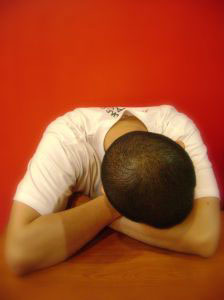We all need sleep. It is essential for both your physical and mental health. If you do not get enough sleep you will crave more calories, think more slowly, have trouble with memory, and even experience psychotic symptoms in cases of long-term sleep deprivation.
When you are dieting, getting ample sleep is essential. If your body does not have enough energy, it will tell you that it wants more calories to help keep it going. If you are tired, it is more difficult to fight off temptations, keep a positive frame of mind, and motivate yourself to exercise.
Sleep can be interrupted by many things, often when someone is unable to fully relax. Few things are more frustrating than trying to sleep when you can’t. Most people do not realize that sleep is a habit, something you teach your body, similar to your stomach “growling” or preparing for food at the time you have taught it to expect that you will eat. In the same way you can learn to sleep. The trick is the discipline it requires and sticking to a routine until sleep comes easily. I have taught several people how to sleep. The process is a bit involved, but can be relaxed once you are sleeping more easily.
- You MUST get up at the same time every day. That means no sleeping in on weekends. If you get up at 6 a.m. to go to work, you have to get up at 6 a.m. on Saturday, even if you came home at 2 a.m. Friday night.
- Do not nap. If you want to learn to sleep at night, you do not want your body to sleep during the day. Also, if you push through the day without much rest, you will be more likely to fall asleep at night.
- Do not do anything in your bed but sleep. This means no reading, eating, watching TV, or arguing. Take it elsewhere. Like Pavlov’s dogs, you want to pair your bed with sleep so it happens automatically.
- Ensure that you have a comfortable sleep environment free of allergens and distractions. Your bedroom should be dark and cool. Make sure your bed is comfortable according to your personal preferences.
 If you are not sleeping, get out of bed! You want to pair your bed with sleep, so lying in bed awake is counter-productive. Participate in quiet, soothing activities, returning to bed the moment you start to feel sleepy. Housework is likely too strenuous. Only read things that you are willing to walk away from, even in the middle of a sentence.
If you are not sleeping, get out of bed! You want to pair your bed with sleep, so lying in bed awake is counter-productive. Participate in quiet, soothing activities, returning to bed the moment you start to feel sleepy. Housework is likely too strenuous. Only read things that you are willing to walk away from, even in the middle of a sentence.
- Start preparing yourself for bed 4-6 hours before you intend to sleep by turning off the TV and computer; avoiding heavy, spicy, or sugary foods; and keeping strenuous activities to a minimum.
- Avoid nicotine and alcohol all together, as neither will help you sleep or sleep well. When you indulge in alcohol, you do not progress in to the deepest levels of the sleep cycle.
- Turn off all computers and televisions. Both screens have a strobe light effect that can be stimulating to your brain, keeping you awake. Many people like to sleep with a television turned on; however, your brain cannot fully rest because it continues to process what it is hearing from the television, even while you are asleep!
White noise, dairy products, and even counting sheep can also be helpful when learning to sleep. If you are not sleeping well, take your physical and mental health into your own hands by teaching yourself to sleep using these tips.
